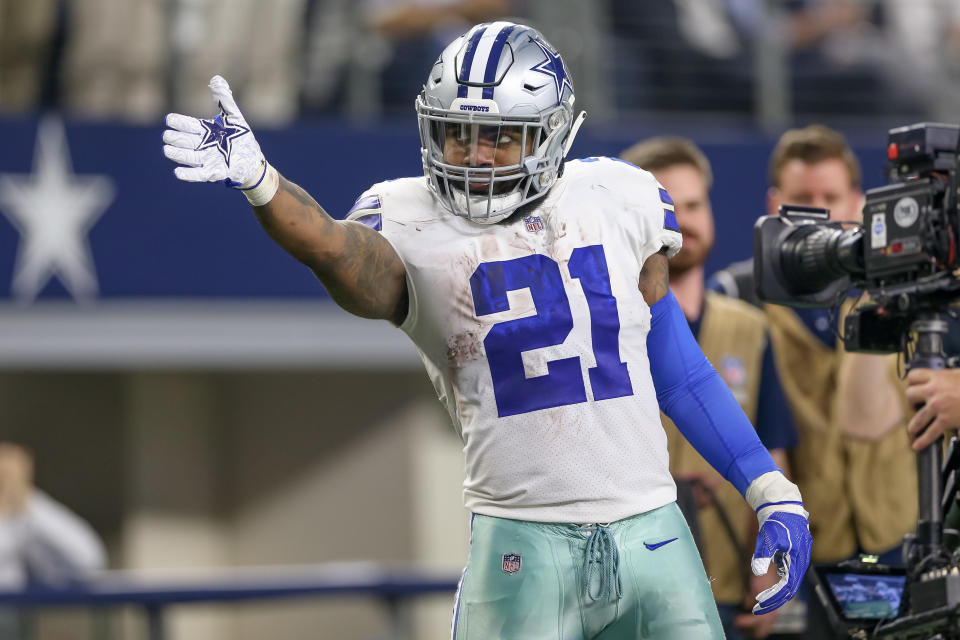Because Ezekiel Elliott recognized his power, he forced the Cowboys to do it, too
For you NFL fans out there simmering about rising player salaries and grumbling about the increasing number of holdouts, there was one moment during Ezekiel Elliott’s news conference Wednesday that certainly caused your blood pressure to boil.
When asked if it was important to him to be the NFL’s highest-paid running back, Elliott, who just used a monthlong holdout to squeeze a six-year deal worth $90 million ($50 million guaranteed) from the Cowboys, confirmed it was.
The 24-year-old was then asked why.
“Because I believe I’m the best,” Elliott told reporters.
It was a short moment, but poignant nonetheless. Now more than ever, professional athletes are recognizing their power in their respective sports. In the NBA, players like LeBron James, Anthony Davis, Kawhi Leonard and others have started leveraging star power to land in new locations for themselves and build the type of teams they want around them.
This realization, naturally, has come last to the players in the NFL, perhaps the stuffiest, most old-money league in the United States. But it has come. When star running back Le’Veon Bell sat out all of 2018 after being franchised-tagged by the Pittsburgh Steelers and still secured the bag this offseason from the New York Jets, it provided a roadmap for players to force their way to new teams and still get paid.

To avoid dealing with that scenario, both the Kansas City Chiefs and Seattle Seahawks dealt their tagged defensive edge rushers (Dee Ford and Frank Clark) before the draft. The Houston Texans did not, and they paid for it by not getting enough back in their trade of edge rusher Jadeveon Clowney.
Yet Clowney cares little about Houston’s pain, and why should he? He’s a winner in this scenario. His trade to Seattle — and his decision to end his holdout, sign his $15.9 million franchise tender and report for practice this week — came with a clause that the Seahawks wouldn’t franchise him this offseason. That agreement paves the way for Clowney to hit the jackpot during free agency in March.
Good for him! And good for Elliott, too.
Players should exercise their power via holdout to earn as much money possible. NFL careers are short, and no one cries for players when their play dips and teams release them to save money on the salary cap. Players have to, in many cases, earn enough to last for the rest of their lives, and the best way to do that is to leverage their employers for more money while they can.
Rest assured, that’s exactly what Elliott and his agent, Rocky Arceneaux, pulled off over the past month. Zeke is now the NFL’s highest-paid running back, and he deserves it. No rusher has been used as much as Elliott since he entered the NFL in 2016, and no running back has been more productive.
Provided the Cowboys are comfortable enough with his off-field behavior — and apparently they are, considering they capitulated to a new deal — there’s no doubting his value to the franchise, regardless of the position he plays.
And while the recent trend is to say smart teams don’t pay running backs big money, stemming from the belief they’re a dime a dozen and less important than they used to be in today’s pass-happy era, it’s obvious the Cowboys’ chances of winning a Super Bowl are greater with Elliott than without him.
[Watch live NFL games on the Yahoo Sports app, download it here.]
Maybe a team takes the risk of trading Zeke and asks its quarterback to pick up the slack if that QB is, say, Aaron Rodgers or Patrick Mahomes, two magicians with the ball in their hands who can beat the perfect defensive call with their arm and elusiveness. But if the quarterback is Dak Prescott — solid, above-average and steady with some playmaking ability — and the team is trying to make the Super Bowl … well, he needs Elliott to hope open up the field.
Zeke knew this, and guess what? The Cowboys did, too, which is why they capitulated. Ultimately, Elliott was too valuable to the Cowboys’ Super Bowl hopes to screw around with for too long.
And really, that’s the important thing because the hunch here is that it will continue to be harder for second-tier players to copy this gameplan. Due to the volume of roster spots (53 per team), NFL players are still more replaceable than their counterparts in other sports, meaning teams have less reason to capitulate unless their backs are really against the wall (see: Houston and the Clowney trade).
Teams understand that in a sport where parity reigns supreme — outside of that improbable dynasty built in New England — elite players are often the difference in a team’s fate, both during the regular season and playoffs. Because of this, franchises are willing to make exceptions, just like the Cowboys did with Elliott by extending him two years before his contract ran out.
Here’s to hoping more such players continue to recognize their worth — and cash in in a similar manner — down the road.
More from Yahoo Sports:

